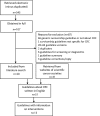Systematic review of clinical practice guidelines for colorectal and anal cancer: the extent of recommendations for managing long-term symptoms and functional impairments
- PMID: 32025805
- PMCID: PMC7181546
- DOI: 10.1007/s00520-020-05301-7
Systematic review of clinical practice guidelines for colorectal and anal cancer: the extent of recommendations for managing long-term symptoms and functional impairments
Abstract
Purpose: Due to increasing numbers of colorectal and anal cancer survivors, more individuals are living with long-term symptoms after treatment. A systematic review was undertaken to assess the extent to which practice guidelines for colorectal and anal cancer provide recommendations for managing long-term symptoms and functioning impairments.
Methods: Four electronic databases and websites of 30 international cancer societies were searched for clinical practice guidelines, consensus statements, or best practice recommendations for colorectal or anal cancer. Quality of included guidelines was evaluated with the Appraisal of Guidelines for Research & Evaluation II tool. Results were narratively summarized.
Results: We included 51 guidelines or consensus statements. Recommendations for managing long-term symptoms or functioning impairments were reported in 13 guidelines (25.4%). All 13 recommend a healthy lifestyle, diet, body weight, and physical activity. The ASCO Colorectal Cancer Survivorship Care Guideline is the most comprehensive, including interventions targeting sexual and bowel function to pain and cognitive issues, and also highlights limited evidence for informing management strategies. Other guidelines recommend treating incontinence, chronic diarrhea, and distress, and stress the need for greater awareness for sexual dysfunction, survivorship clinics, and referrals to specific supportive care interventions.
Conclusions: Few clinical practice guidelines include recommendations for managing long-term symptoms and functioning impairments. It is unclear if this is due to limited evidence or absence of management strategies and interventions. Clear recommendations for managing long-term symptoms and functioning to help health professionals in supporting colorectal and anal cancer survivors are needed.
Keywords: Anal cancer; Clinical practice guidelines; Colorectal cancer; Long-term functioning; Long-term side effects; Long-term symptoms.
Conflict of interest statement
The authors declare that they have no conflict of interest.
Figures



References
-
- Australian Institute of Health and Welfare. Cancer compendium: information and trends by cancer type 2019 September 30, 2019]; Available from: https://www.aihw.gov.au/reports/cancer/cancer-data-in-australia/contents...
-
- Wiltink LM, Chen TY, Nout RA, Kranenbarg EM, Fiocco M, Laurberg S, van de Velde C, Marijnen CA. Health-related quality of life 14 years after preoperative short-term radiotherapy and total mesorectal excision for rectal cancer: report of a multicenter randomised trial. Eur J Cancer. 2014;50(14):2390–2398. doi: 10.1016/j.ejca.2014.06.020. - DOI - PubMed
Publication types
MeSH terms
Grants and funding
LinkOut - more resources
Full Text Sources
Medical

